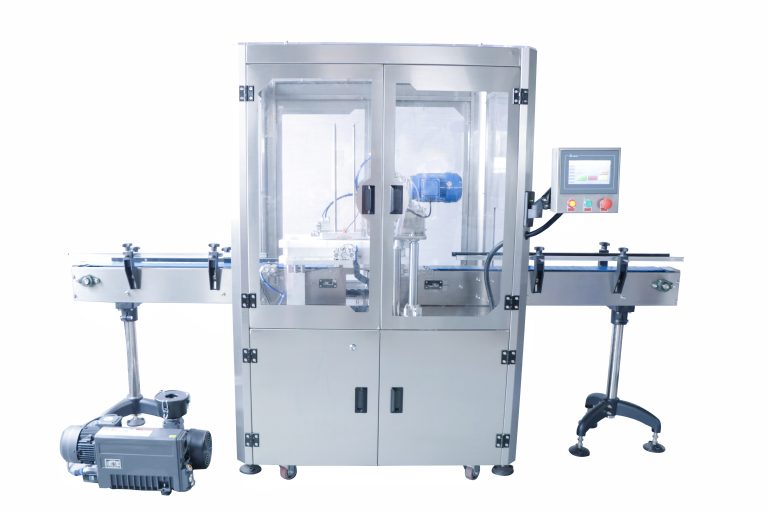Table of Contents
Proper Cleaning and Sanitization Procedures for Can Lids
Contamination of can lids is a serious concern in the food and beverage industry. Improperly sealed cans can lead to spoilage, bacterial growth, and potential health risks for consumers. To prevent contamination of can lids, it is essential to implement proper cleaning and sanitization procedures. Dust-proof lid capping machines are a key tool in ensuring that can lids remain free from contaminants.
One of the most important steps in preventing contamination of can lids is to ensure that the lids are thoroughly cleaned before they are sealed onto the cans. This can be achieved through the use of dust-proof lid capping machines, which are designed to remove any dust, dirt, or other particles that may be present on the lids. These machines use a combination of brushes, air jets, and vacuum systems to ensure that the lids are completely clean before they are sealed onto the cans.
In addition to cleaning the can lids, it is also important to sanitize them to kill any bacteria or other microorganisms that may be present. This can be done using a variety of sanitizing agents, such as chlorine bleach or hydrogen peroxide. It is important to follow the manufacturer’s instructions for the proper dilution and application of these sanitizing agents to ensure that they are effective in killing any harmful bacteria.
Proper cleaning and sanitization procedures are essential for preventing contamination of can lids, but they are not the only factors to consider. It is also important to ensure that the can lids are stored in a clean and dry environment to prevent the growth of mold or other contaminants. This can be achieved by storing the lids in airtight containers or bags and keeping them away from sources of moisture or humidity.
Regular inspection of the can lids is also important to ensure that they are free from any signs of contamination. This can be done by visually inspecting the lids for any signs of mold, discoloration, or other abnormalities. If any contaminated lids are found, they should be discarded immediately to prevent the spread of contaminants to other cans.
In conclusion, preventing contamination of can lids is essential for ensuring the safety and quality of food and beverage products. Proper cleaning and sanitization procedures, along with the use of dust-proof lid capping machines, are key tools in preventing contamination and ensuring that can lids remain free from harmful bacteria and other contaminants. By following these guidelines and implementing proper hygiene practices, food and beverage manufacturers can help to protect consumers and maintain the integrity of their products.
Importance of Using Dust-Proof Lid Capping Machines
Contamination of can lids is a serious concern in the food and beverage industry. When can lids become contaminated, it can lead to spoilage of the product inside, resulting in financial losses for the company and potential health risks for consumers. To prevent contamination of can lids, it is essential to use dust-proof lid capping machines.
Dust-proof lid capping machines are designed to seal can lids in a way that prevents dust and other contaminants from entering the can. These machines are equipped with special features that create a tight seal around the lid, ensuring that no outside particles can make their way into the can. By using dust-proof lid capping machines, companies can significantly reduce the risk of contamination and ensure the quality and safety of their products.
One of the key benefits of using dust-proof lid capping machines is that they help to maintain the integrity of the product inside the can. When contaminants enter the can, they can alter the taste, texture, and appearance of the product, making it unappealing to consumers. By using dust-proof lid capping machines, companies can ensure that their products remain fresh and uncontaminated, preserving their quality and flavor.
In addition to maintaining product quality, dust-proof lid capping machines also help to extend the shelf life of canned goods. When contaminants enter the can, they can promote the growth of bacteria and other microorganisms, leading to spoilage of the product. By using dust-proof lid capping machines, companies can prevent contamination and ensure that their products remain safe for consumption for longer periods.

Furthermore, dust-proof lid capping machines are essential for ensuring compliance with food safety regulations. In many countries, there are strict guidelines in place regarding the handling and packaging of food products to prevent contamination and ensure consumer safety. By using dust-proof lid capping machines, companies can demonstrate their commitment to food safety and compliance with regulations, avoiding potential fines and legal issues.
Overall, the importance of using dust-proof lid capping machines cannot be overstated. These machines play a crucial role in preventing contamination of can lids, maintaining product quality, extending shelf life, and ensuring compliance with food safety regulations. Companies that invest in dust-proof lid capping machines can protect their products, their reputation, and their bottom line.
In conclusion, dust-proof lid capping machines are an essential tool for preventing contamination of can lids in the food and beverage industry. By using these machines, companies can maintain product quality, extend shelf life, ensure compliance with regulations, and protect their reputation. Investing in dust-proof lid capping machines is a smart decision for any company that wants to prioritize food safety and quality.






